ETH News
All stories that have been tagged with Chemistry
This nanotube has a nose for oxygen
News

ETH researchers have developed a low-cost sensor made of carbon nanotubes that can selectively, efficiently and reliably measure minute quantities of oxygen in gas mixtures under light. The detector could be widely used in industry, medicine and environmental monitoring.
Complete breakdown of plexiglass into its building blocks
News

Polymer chemists at ETH Zurich have discovered a surprising way to virtually fully break down PMMA plastic – commonly known as acrylic glass – into its monomer building blocks. The process remains unaffected by the presence of additives.
ETH Zurich researcher aims to prevent urinary tract infections with a vaccine
News

Every second woman and every eighth man suffer from urinary tract infections. These are painful and can recur with serious health consequences. Pioneer Fellow Giorgia Greter has a solution.
Light green hydrogen will do

Whether sustainably produced hydrogen needs to be 100 percent green is currently under debate. Using the production of ammonia and artificial fertiliser as examples, researchers have calculated that "nearly sustainable" hydrogen would be better in the end.
AI designs new drugs based on protein structures
News

A new computer process developed by chemists at ETH Zurich makes it possible to generate active pharmaceutical ingredients quickly and easily based on a protein’s three-dimensional surface. The new process could revolutionise drug research.
How to make bright quantum dots even brighter
News

Researchers at Empa and ETH Zurich have developed methods for making perovskite quantum dots faster and more efficient emitters, thereby significantly improving their brightness. This is relevant for applications in displays as well as in quantum technologies.
Sustainable scents from the mountain of the gods
News

ETH Zurich chemist Freideriki Michailidou is developing novel processes for the sustainable production of fragrance ingredients. As a first step, she studied the scents of rare aromatic plants that grow only on Mount Olympus in Greece.
Sustainable clean drinking water solution
News

ETH postdoc Olivier Gröninger is improving the drinking water supply for people in rural areas of South America with his Openversum project. This benefits not only the families but also the local economy and the climate
Attosecond measurement on electrons in water clusters
News

Researchers at ETH Zurich have developed a method that enables time-resolved measurements of electron motion in water clusters lasting only a few attoseconds. The technique can be used for more detailed studies of water as well as faster electronics.
Component for brain-inspired computing
News

Researchers from ETH Zurich, the University of Zurich and Empa have developed a new material for an electronic component that can be used in a wider range of applications than its predecessors. Such components will help create electronic circuits that emulate the human brain and that are more efficient at performing machine-learning tasks.
Spark Award for new biochemical method
News
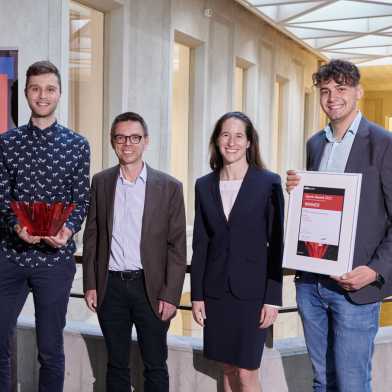
From diagnostics to treatment, the biochemical method developed by Daniel Richter, Edgars Lakis and Jörn Piel paves the way for a diverse range of applications in research and medicine. The researchers received the ETH Zurich Spark Award 2022 for their innovative solution.
Light amplification accelerates chemical reactions in aerosols
News

Aerosols in the atmosphere react to incident sunlight. This light is amplified in the interior of the aerosol droplets and particles, accelerating reactions. ETH researchers have now been able to demonstrate and quantify this effect and recommend factoring it into future climate models.
Breaking down plastic into its constituent parts
News

A team of ETH researchers led by Athina Anastasaki have succeeded in breaking down plastic into its molecular building blocks and in recovering over 90 percent of them. A first step towards genuine plastic recycling.
Plastic recycling shouldn’t be an end in itself
Zukunftsblog

Wanting to keep plastics in circulation is currently en vogue. According to Magdalena Klotz, however, high collection rates are of little use if recyclate only replaces virgin material to a limited extent.
Applying the butterfly principle
News
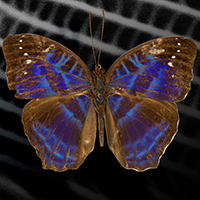
ETH Zurich researchers have created artificial colours by 3D printing certain nanostructures inspired by those of a butterfly. This principle can be used in the future to produce colour screens.
Growing carbon footprint of plastics
News

After analysing the global plastics value chain, ETH researchers have revealed that the impact of plastics on climate and health is bigger than originally thought due to the increased use of coal for process heat, electricity and as a raw material in production.
The protein engineer
News
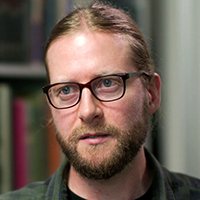
Tom Edwardson modified a tiny artificial protein structure so it could be used as a vehicle for RNA molecules and other active substances. He now aims to create a spin-off to bring his development to market.
Worrying insights into the chemicals in plastics
News
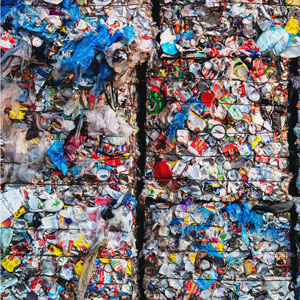
ETH Zurich researchers examined chemicals in plastics worldwide. They found an unexpectedly high number of substances of potential concern intentionally used in everyday plastic products. A lack of transparency limits management of these chemicals.
Understanding the evolution of viruses
News

Researchers at ETH Zurich have recreated a key step in the evolutionary history of viruses in a laboratory experiment. They succeeded in remodeling a natural protein to create capsids capable of storing genetic material.
How aerosols are formed
News

ETH Zurich researchers conducted an experiment to investigate the initial steps in the formation of aerosols. Their findings are now aiding efforts to better understand and model that process – for example, the formation of clouds in the atmosphere.
Robots that cut, bees that bite
News
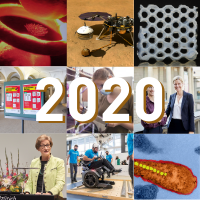
An extraordinary year is drawing to a close. ETH News takes a look back at the highlights that emerged amidst difficult and unsettling times, at ingenious ideas, fascinating science and solidarity in action during – and despite – the coronavirus pandemic.
Decoding the way catalysts work
News

Splitting water into hydrogen and oxygen is an important chemical reaction, especially considering that the use of hydrogen as an energy source in sustainable mobility in the future. An international research team has now decoded how one of the catalysts used in this reaction works.
Spark Award winners illuminate tumours
News

Making tumours visible so that surgeons can cut only as much as necessary: this is the goal of an invention by chemical biologists Helma Wennemers and Matthew Aronoff. For their achievement they have received the Spark Award, with which ETH recognises the most innovative invention with the most commercial potential of the past year.
The Antibody Engineer
News

For his doctoral thesis, Jonathan Kiefer manufactured antibodies that help the body’s own immune system to defend against leukaemia cells. With a Pioneer Fellowship from ETH Zurich, he now plans to make his dream a reality: further develop the molecules – and bring the therapy to market.
Marker substance for research into brain diseases
News
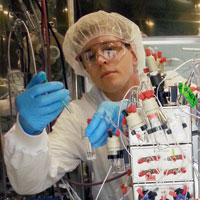
A new substance makes particular molecules in the brain visible using imaging, enabling better research into brain diseases.